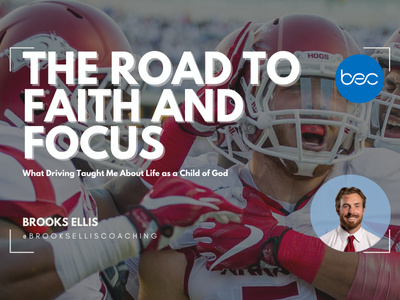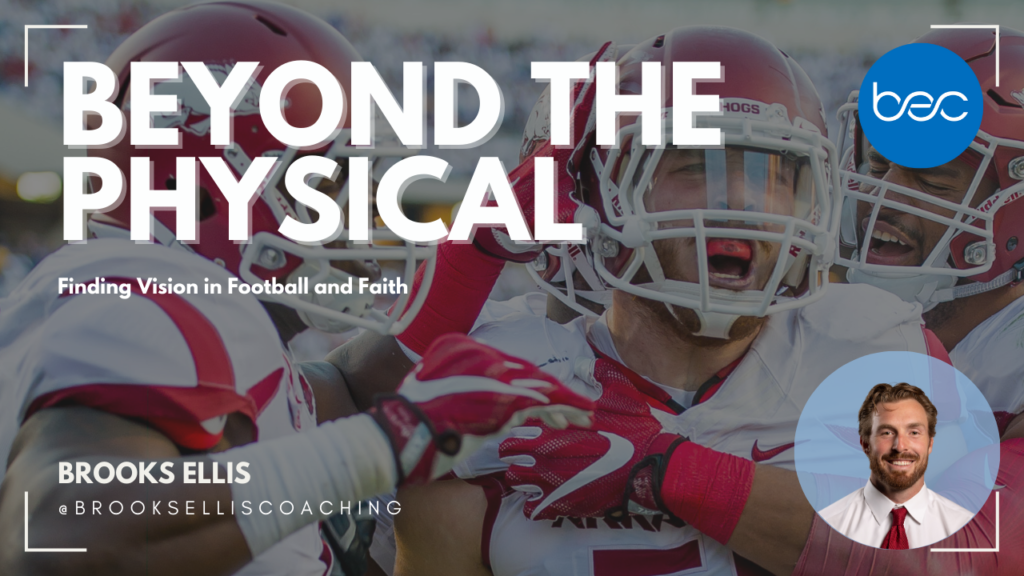Learning How to Drive
If you drive a car, you’ve hopefully passed your driving test and earned a license. After training with your parents at a certain age—when you can finally reach the steering wheel and have just an inkling of maturity—they give you more control over how far you can travel. You begin by simply driving around school parking lots, then progress into the neighborhood, around the city, and finally to different cities. This progression builds confidence in your parents that you can handle greater responsibility and prevents you from feeling overwhelmed.
Now, imagine not knowing how to drive and being placed directly in Dallas rush-hour traffic for the first time. How would that go for you and everyone around you? You’d be incredibly stressed, make everyone else upset, and cause more traffic, horns honking, and pure chaos. It’s not your time to be in Dallas rush-hour traffic—you’re not there yet. However, for someone with more experience, it’s just another day of driving.
A new city brings new challenges, new turns, and new types of drivers. Luckily, the rules of the road are generally the same. While signs may differ between states, the fundamental rules stay consistent. When you don’t follow them or fail to pay attention, that’s when things turn out poorly. The situations you encounter may vary, but the framework remains.
Learning to drive is as painful—or more so—than acquiring any other skill. It’s sticky. Sometimes it’s overwhelming, and other times you feel like you’re finally getting the hang of it. Then, all of a sudden, you forget to turn on your blinker or take too long to turn, and the angry driver behind you lays on the horn.
There’s a lot at stake: your life and others. Fast-moving cars, angry drivers, and numerous rules make it hard to keep track of everything. But you know that to have the freedom you desire, you must endure the pain of learning a new skill, trusting that it will be worth the struggle. Feeling overwhelmed is part of the process.
During this time, parents are probably terrified. They’re concerned about their child’s driving abilities and personal safety and may not want them to grow up. For example, my parents were horrified by my driving—I found incredible joy in zooming around corners and racing every car. I can only imagine their horror the first time they allowed me to hit the highway.
There are books, guidelines, tests, and instructions. If you want to be a good driver, it’s important to know how. Learning takes time, effort, and sincere attention. The books and instructions are helpful, but at the end of the day, if you want to learn how to drive well, you have to actually drive. You just have to do it, try again, and keep showing up until you get it.
One day, you’ll wake up and find yourself driving cross-country to California. Freedom at last!
Despite your confidence and skill level, people will honk at you. Someone honked at me yesterday, and I’ve been driving for almost 15 years. It’s just part of experiencing life. You grow as you do. You get better the more you practice and focus on improving this skill. Though learning a new skill is incredibly difficult, frustrating, and exhausting, your desire for freedom drives you to push through.
Rules of the Road
Unfortunately, there are rules to follow. For my fellow speed racers who think they can do whatever they want without consequences—you’re not above the law. In fact, it’s because of people like you that we even have laws. Deep down, we all know they are there for a reason. We drive within the same rules because we share the same road. If we all adhered to different rules, how could that be successful for anyone? There must be an organized framework by which we drive.
The rules aren’t random. They are intricately designed to smooth out traffic and prevent wrecks. Rules exist specifically because horrible accidents have happened, and to prevent further incidents, they must be enforced. As things change—improved technology, better cars, smoother and wider roads—the rules may change. The speed limit may increase. A four-way stop sign may turn into a roundabout. The ultimate function of the rules is our well-being. They might not sound like fun, but we know they are there for a reason.
Without rules, there would be chaos. If I see a red light and decide it’s actually green because I don’t feel like waiting, there will be issues for me and those around me.
Humans created this imperfect system so that we don’t wreck and can live happy lives, allowing us to reach our destinations. The framework we drive by enables the system to function well. The rules are there because we all share a common goal: to be healthy, happy, and have a good experience arriving at our destination.
Enforcing Rules
As you progress as a driver, your parents set different rules for you. They know that left to your own devices, you might be reckless and make unwise decisions—like joyriding late at night with friends or driving into unsafe neighborhoods. Your parents worry about you but know you must live your life. They want you to have fun, but too much fun can lead to danger; therefore, they enforce rules. They have to; otherwise, they wouldn’t be good parents, and you might hurt yourself or others.
Carefully, they loosen the reins and allow you to expand your travels—from the parking lot to traveling overseas. It’s part of a child’s progression that enables them to experience the fullness of life and gives parents joy to see them live life to the fullest in a way that respects the rules, keeps them safe, and reflects well on their parenting.
Law enforcement also plays a role in enforcing rules. They must uphold the rules of the road because if they were just suggestions, nobody would follow them. Everyone wants to speed if they can get away with it. It’s not fun, but we all know they are doing their job and keeping the majority safe. Those who don’t follow the rules are subject to consequences.
Being a Good Driver
To be a good driver, it’s important that you know the rules, learn how to drive, and are prepared to drive.
We’ve discussed the rules and learning how to drive; now, you must be prepared. Being prepared means you’ve taken care of yourself and are ready to drive. If you haven’t slept, you’ll be as effective a driver as if you were intoxicated—not helpful. It’s also important to be calm and relaxed, as driving can bring out the worst in everyone.
Another aspect of preparation is knowing where you’re going and how much time it will take to get there. If you have a meeting at 3 p.m. and it takes 15 minutes to get there, you should leave by 2:30 p.m. to account for traffic or unexpected delays. Arriving early allows you to be stress-free and show up as your best self.
Preparing also means ensuring the car is safe to drive: it has gas, tires are properly inflated, the oil is changed, the windshield isn’t broken, etc. Make sure the car can get you there safely. If not, take it in for maintenance.
Attention on the Road
Sometimes, you’ll be driving and arrive at your destination wondering how you got there. Our minds are crazy sometimes.
Your safety from point A to point B requires attention on the road and other drivers. Your life, your experience, and your car depend on it. When your attention is fully on the road with zero distractions, chances are you’ll be more relaxed because you’re aware of what’s happening, able to make predictions, and prepared to stop, creating a positive experience for you, your passengers, and other drivers.
You can see when traffic is building up and prepare to slow down. You can turn on your blinker and make a safe turn. You can make expert moves—merging into an open lane and bypassing traffic because you’re paying attention.
Everybody else is distracted; all you have to do is wake up.
You can only see opportunities to drive more effectively if you’re present and aware. Being aware means you know what’s happening around you and have a better chance of driving safely and efficiently.
Your safety and experience rely on where you place your attention.
Being a Bad Driver
Conversely, if you’re rushing from point A to point B, you won’t see these opportunities, and you’ll stress out everyone around you. You’ll be weaving in and out between cars, hearing honks left and right. You’ll wonder why they’re honking because you can’t see that you’re driving like a maniac. You’ll get angry when someone cuts you off, miss your exit, and slam on your brakes when you forget to slow down at a stop sign. This is pure chaos.
If, unfortunately, you get in a wreck—and of course, it wasn’t your fault—likely one of three things happened: you weren’t paying attention, someone else wasn’t paying attention, or somebody was making bad decisions.
Sometimes, it truly isn’t your fault, but what if you had the space mentally to prepare for adverse situations? What if you knew to take extra precautions at a particular intersection or slow down because speeding isn’t worth it? Nobody can tell you when that situation will come up; you have to sense it. Being present is the only way you’ll be able to know and react accordingly.
Features of the Car
Let’s say you’re driving along in your new car with all its bells and whistles: cruise control with car-approaching sensors, climate control, and parallel parking assist. These fancy features help prevent you from crashing and reduce the attention required on the car itself.
Despite all the gadgets, we are still in ultimate control of the car. One day, maybe we won’t be, but until then, it’s up to us to get the car and our passengers from point A to point B.
These tools support us so our attention can be placed on the road instead of the car itself. We can relax so we can drive better.
When cars were first invented, people probably had to worry about the car itself and whether it was even ready for a short ride across town. Our concerns revolve around which fuel is more eco-friendly and how we can spend less time driving and more time on our phones.
These features make our driving experience more enjoyable. We can listen to surround sound music, have a smooth and seamless ride—it’s incredible what we’ve been able to do to improve driving.
Driving Is Not Our Life
Fortunately, driving is not our life. We drive to travel from place to place; it’s just a transitional period. But driving is a part of our life and. It’s how we get things done, see new people, and try new things. We get to experience all that life offers because we can drive.
If we didn’t see the value in driving, we wouldn’t. It wouldn’t be worth our time or risk—and there is certainly a risk. We endure the grueling 14-hour drive to Colorado so we can have fun on the slopes. The risk and the torture are worth the reward.
Knowing how to drive and driving well are two separate things. One is knowing the rules of the road, how to operate the car, and how to manage different situations with other drivers. Driving well is knowing those things and deciding to apply them. You’ve learned what it means to drive well and how it affects those in your car and those around you. The spirit of driving well is the spirit you’ve embodied. You drive well because it’s more enjoyable in the long run, it keeps you safe, and you know that it’s not about driving but where you are going.
Where You’re Headed
Driving isn’t something we do randomly with no purpose. Driving reflects our desire to get somewhere. A good driver has the right destination because they know that destination is beneficial to their life.
Along the road, you’ll find many distractions: ice cream shops, scenic views, nightclubs, tasty restaurants, people enticing you to come hang out and relax.
A good driver keeps their eyes on the road, avoids distractions, and stays focused. The destination will come, but along the way, due to their presence on the road, they find a quality of driving unlike other drivers.
They aren’t distracted, can see the road, make good predictions, redirect if they make a mistake or encounter a traffic jam, slow down gently, and communicate to other drivers when they’re turning.
Their quality of driving is not only safe for those inside the car but for everyone around them. It’s more efficient, it’s a better life, and you’ll arrive at your destination having helped those around you. Because you’re focused, you’re a better driver.
As a driver, your role is to know where you’re going and get the passengers to the destination safely. Being focused, you’ve done what you’ve been called to do.
How you drive is the destination.
God’s Kingdom
Similar to driving, our life on earth reflects our journey of learning how to be human and arriving safely at the ultimate destination. It’s the human condition to learn what it means to be fully human, operate well, learn the rules of being human, and arrive where God has destined for us to go.
Learning How to Be Human
As we grow up, we learn how to operate our bodies. We learn to move, think, speak, listen, pray, hurt, and love. We also learn what works and what doesn’t. I like to read and write, while others like to watch football games. We mature and improve our ability to communicate.
As a kid, I valued gaming and playing outside. In college, I liked going out with friends and sacrificing sleep for fun. Thankfully, those things don’t appeal to me now. What has changed? My vision. I see that those things don’t serve me any longer. They are distractions that won’t help me get to where God wants me to go.
As we mature spiritually, understanding the rules, and obeying His commands, He slowly gives us more responsibilities. Our skills grow, our vision opens, our hearts enjoy, and our quality unifies. It’s through our respect for His rules, adoration for His being, and desire to please Him, similar to following the rules, trusting their goodness for our safety, that allows us to experience His kingdom. He wants us to drive to California, but we have to be ready!
Through our progression in spiritual maturity, our skills and presence changes because of our dedication to following Him. Our ability to change differs from God’s unchanging nature. We can change because He doesn’t. Our foundation is Him, and He provides the perfect framework from which we can slowly be shaped into unification with Him, as we learn how to be more and more human, just as Jesus did (John 17:11).
As we grow, God gives us more responsibility. On earth, we need our physical parents to survive until we don’t. Spiritually, we rely on something that keeps us grounded and headed in the right direction. It’s the only way to survive our infantile spirit.
It’s our reliance on God, not our fleshly desires, that keeps us aligned with His guidance and opens up the doors to live in His kingdom.
Following His Rules
Many people leave the church because they feel like Christianity institutionalized guilt. The message for many is that if you’re not perfect, then you should be ashamed, and Christians feel it’s their responsibility to enforce those judgments on their kids and those who don’t know any better.
While it feels like there’s a Christian revolution occurring right now, it’s no wonder so many are leaving the church.
Others’ sin is not for you to judge. We are here to love one another (John 13:34). God enforces the rules, and disciplines us, as He is the Creator.
The laws He created—elucidated by trustworthy scientific research—are true. We all play by the same rules otherwise there would be fairness. There could only be one set of rules. Understanding and following the rules means recognizing that while it looks like fun to stay up late gaming or drinking with friends, there are consequences that go far beyond the physical.
God created this universe with an organized set of rules so we can have a better life experience and arrive in Heaven with the Almighty while here on earth (John 17:15). He gave us the framework by which to live, the Bible, and an ideal example through Christ, and now the Spirit to believe that gives us the ability to know God as Christ knew Him (John 14:9).
The rules might not look fun, but we know they are there for good reason. They help us drive better and arrive at our destination, filled with infinite, endless, and overwhelming joy.
What could be better than that? We must see through the immediate fun, which enslaves us to the physical realm, knowing that behind it all is a spiritual realm, opening us to unlimited possibilities, joy, and bliss.
Using Our Human Features
Our bodies and minds were uniquely created by Him so we can utilize our particular tools and skills appropriately. Some cars are built for speed, while others are built to transport tiny soccer players to their matches. Some people are built to communicate, while others are built to be excellent athletes.
While each of us is unique, it’s still us as the driver of the most important car. A speed racer placed in a semi-truck will not do well, will not lead to peace.
We are not our bodies or our thoughts. We are the driver of the car—the awareness that allows us to experience our bodies, our thoughts, and this life. We need to know where we’re headed, how much time we have to get there, and the rules of the road. We also need to understand that it’s not just about us but our relationship with others on the road. The quality of our experience affects other people’s experiences.
God guides us through life in a progression so that when we are ready to travel the globe, it will not overwhelm us. It will still be stressful, but we have the tools and confidence to handle the various adverse situations that will arise.
With endless distractions available—even internally from incessant thought patterns—we must keep our attention on the present moment. Our phones, gadgets, thoughts about work tasks, or personal issues can deter our attention from living well. But with refocus and realignment, we can enjoy the journey and get to where God is directing us.
Attention and Presence
Jesus says, “I am the light of the world: he who follows Me shall not walk in darkness but shall have the light of life” (John 8:12). What is the light of the world but that which allows us to see clearly all that is available to us? The perfect soul—God in human form—aligned with God and exemplified what it meant to act out God’s will.
He even says, “The works that I do, he shall do also, and greater works than these he shall do because I go to the Father.” (John 14:12) Through alignment with Christ, we see the Father, and will do all that he has done and more. If we don’t know this to be true, why? Seems like the most important fact we can know.
As drivers, we believe in the rules of the road because we can see how disobeying them leads to dysfunction. As humans, we all live by the same rules of life. The Creator made it so. He has created this world with certain rules. To follow the rules means to engage in behaviors that show we respect creation and understand that the rules are built for our well-being. We believe that the Father loves us and by following His commandments, we will be led to our destination.
Doing whatever we want, thinking we know better, will lead to a distracted life, and a failure to arrive in Heaven.
When we believe in Christ, we “eat His flesh and drink His blood” (John 6:41-47), meaning we do as He did. Christ obeyed the rules of the road; His actions and words were of God because He alone knew God. Believing in Him means we understand that the way He does things is of God and that by obeying Christ within (Galatians 2:20, Colossians 1:27), we are following God’s instructions for us.
Christ within gives us full awareness of the present moment so we can live knowing the rules, live safely, experience life in ultimate peace, and progress toward our destination.
Obeying His Rules
A good parent disciplines their child for disobeying the rules of the road. It’s the only way we can improve as drivers. It’s the only way we can progress to the point where we can go out on our own and do cool things, like see the world! If we never learn these lessons, our parents will never trust us with greater responsibilities.
How much greater is a perfect God, who wants us to know Him (John 17:3: “This is eternal life, that they may know You, the only true God, and Jesus Christ whom You have sent”)? He will open up the world to us at the right time when we are ready. It’s not a physical thing you can see. He lives on a different plane—in the Spirit (John 6:63).
Our spiritual food, His will, isn’t something we can see. It’s spiritual. It’s like the wind (John 3:8). You know it’s moving and what it moves, but you cannot physically see it. It’s something you can sense beneath the physical. Our tools become easier to use. Your experience becomes brighter. Your impact on others becomes more powerful and encouraging. You have a way about you that is undeniably different than before. You can’t quite put your hand on it; it can’t be measured, but it’s there.
We must obey the rules because it’s what’s best for us. If we didn’t have a choice, we would be robots; this would be a dictatorship, and there would be no love. Love isn’t forced. It’s there for the taking, but you must be able to see it and choose to follow the rules because you know it’s best for you. That’s the purpose of the rules of the road, the role of a parent, and the role of a loving Father.
Being present means that you believe in Him, Jesus Christ. You believe He is the Son of Man, and the Spirit resides within you (John 14:17). It means that you are not relying upon your own mind to prevail but are allowing the infinite Creator—the one who made your otherworldly intelligent body with all its sensors and machinery—to guide you through your day.
Humans created cars with sensors, frameworks, and technology to help us arrive safely at our destination.
How much greater is our God, who built this human body and mind to help us arrive at the ultimate destination—in the present moment, full of pure joy and eternal bliss, in the kingdom of God? God created humans uniquely so we can know Him and be with Him.
Eternal life is “that they may know You” (John 17:3). To know Him is to be at one with Him. He knows no time before the world (John 17:5) and doesn’t live in our realm of time. He exists beyond it all. To be at one with Him allows us to experience time in the physical as it passes while living and knowing Him in the eternal.
Distractions along our journey prevent us from knowing Him. Our minds and thoughts are not to be trusted, but a clear mind and focus on Christ within bring relaxation to our bodies, rest to our minds, clarity to our thoughts, and oneness with the Creator. It allows us to have a better life experience and experience all God is—knowing Him and conducting His will.
It Requires Our Attention
Being human requires our full attention on being human. It requires that we prepare our minds to live and be present in the moment. Our destination is coming, but through unification with God, we live a life built upon His guidance, not on our own will. Only when we’re present can we know where He is guiding us. Distractions lead to wrong turns, stressful intersections, and chaotic interactions.
Distractions lead to an unfulfilled life. Focus leads to a God-centered, infinite life.
As children of God, a calm journey depends on calm travelers, and God calls for us to keep the roads clear and calm, just as His Son exhibited in every moment.






